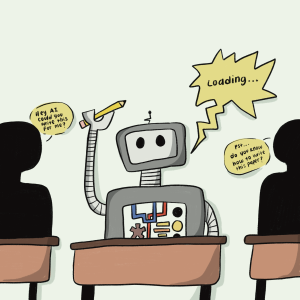
Against the wishes of many professors, artificial intelligence has made its way into the classroom and hands of students. The current University of Mississippi policy for generative AI allows individual professors to decide how, or if, it will be used in their classrooms. Predictably, there is controversy over the potential of AI as a tool for academic dishonesty.
While many people believe students will take advantage of AI to do their work for them, others see it as a new and essential skill.
Chang-Won Choi, an integrated marketing communications professor, has a classroom policy that allows students to use AI for marketing projects but forbids its use for writing assignments.
“If (students) rely on Al tools when they write a paper, it might give them some kind of incorrect or inaccurate information, and they might not be able to improve their writing skills,” Choi said. “But when they create something new, then they might be able to get something new and different from their perspective.”
Choi believes that students need to learn how to use AI responsibly before entering the workforce.
“If after graduation they use AI tools to develop something new and to create advertising campaign websites, they have to know how to use it correctly and ethically,” Choi said.
Freshman biological science major Jayden Cochran believes that heavily relying on AI will limit a student’s creativity.
“AI should definitely not be allowed in classrooms,” Cochran said. “It devalues the human experience. I think that taking information and inspiration from AI will limit creativity.”
On the other hand, Kelsa Pellettiere, a graduate instructor for the Department of History, believes that AI can be a valuable resource if students do not misuse it.
“It’s much better for students if they use it to help teach them how to be better at something versus expecting it to do it for them,” Pellettiere said. “At the end of the day, you’re not benefiting from doing that anyway, and it’s going to hurt you in the long run. But, if students would use it to help teach themselves and to tutor themselves, that might be quite useful down the road.”
Derek Bruff, visiting associate director of the Center for Excellence in Teaching and Learning at UM, is aware of the recent developments in AI technologies and held a presentation at UM in August detailing the approaches faculty can take to regulate it.
“We have been trying to kind of share some of those findings and ideas with faculty so that faculty can feel more prepared to navigate the landscape and the choices that they have to make around these tools,” Bruff said.
While some may believe AI usage in the classroom is limited to cheating, Bruff detailed the types of AI tools he regularly uses, explaining how they help him with his job.
“Midjourney is an image generator that generates all kinds of images and illustrations, and I’ll use that in my presentations or blog posts sometimes when I need to illustrate something,” Bruff said. “There’s also a tool called Elicit, where you can give it a research question, and it will go search a huge database of journal articles and other scholarly sources that might help you answer your question. I use that several times when I’m trying to find some more sources for something.”
Even if people disagree on how AI should be regulated, AI technologies will inevitably continue to progress, and educators must reckon with it in their classrooms.
“The rise of these generative AI technologies means we do need to rethink how we assess students and what types of activities we give them,” Bruff said. “I think, as educators, we’ve got a responsibility to help prepare our students to navigate a world where AI is increasingly commonplace.”



























